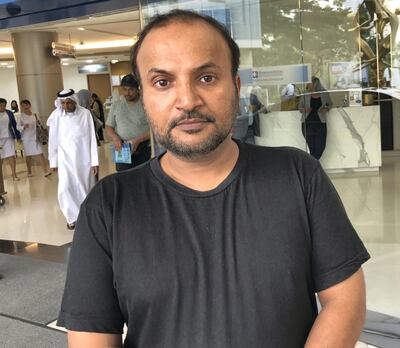Saleh Al Harthi has been by his mother’s side for the past three months following her surgery in Bangkok Hospital, where thousands of Emiratis check-in for medical treatment.
"Before the operation, I had to carry her because she could not move. She also could not remember anything because the blood was not reaching her brain and created complications. Following the operation, she is trying to stand and inshallah she will walk again after rehabilitation," the Abu Dhabi school administrator said. He takes turns with his sister to look after their mother, 63.
To ease her condition, doctors at the private Bangkok Hospital cleared a blocked carotid artery, the major blood vessel located in the neck that delivers blood to the brain.
A catheter was inserted as part of a brain angioplasty procedure to keep the artery open, restore blood supply and it has saved her life, her son said.
Mr Al Harthi spoke of the family’s helplessness when her condition could not be diagnosed in the UAE and their relief when an appeal to cover overseas treatment was accepted by the office of the Crown Prince of Abu Dhabi and Deputy Supreme Commander of the Armed Forces, Sheikh Mohammed bin Zayed.

When they reached out to experts abroad, the doctors in Thailand were confident of handling her condition.
Some 20,708 people from the UAE were treated at the Bangkok Hospital last year.
For critical treatments in oncology, cardiology, neurology and specialised orthopaedic procedures, UAE nationals travel to Thailand, Germany, the UK and India.
In life-threatening cases, families seek financial coverage from health authorities in Dubai and Abu Dhabi or the Crown Prince’s office.
UAE tourists on vacation in Thailand also book appointments for a second opinion to resolve a persistent ailment or sign up for complete health check-ups.
Of their overseas patients, UAE citizens make up the second largest group at the hospital after neighbouring Myanmar.
Patients from Kuwait, Oman and Qatar are among other GCC countries to seek treatment here.
Thailand was rated among the top 10 medical tourism destinations by US-based publisher Healthy Travel Media.
In the brightly-lit lobby of the hospital, families from the Middle East form a tight-knit group that offers support to worried relatives. They are usually grouped in the Arab Medical Services section that covers the entire ground floor and caters specifically to Arabic speakers.
Another Emirati, Abdullah Al Rashidi, has spent the past eight months caring for his wife who underwent chemotherapy for stomach cancer in the hospital last year.
They have returned for treatment after the cancer spread to her lymph nodes.
The couple’s seven children, aged 3 to 19 years, recently returned home after spending their summer vacation in Bangkok to be near their mother.
“It has not been easy for us but my wife should not be alone,” Mr Al Rashidi said.
“We are grateful that my government will cover everything and I trust the doctors here.”
The hospital employs more than 100 translators to help Thai doctors converse with Arab patients and relatives.
Prayer rooms are located in the Arab section, iftar is observed during Ramadan and immigration officers come to the hospital on Saturday to extend visas nearing expiry to lessen the burden on already anxious relatives.
“We deal with patients as family. We understand completely that an Arab patient never travels alone, there are always four or five family members with him. One doctor tracks the patient through all the specialists and a translator is always present so no one feels alone, either,” said Aqeel Bokisha, an Emirati consultant to the hospital’s chief executive who is based in Bangkok.

“In the GCC, if one guy is happy, he will bring 10 to 15 more people because all the relatives sit in a majlis or coffee shop and talk to each other. Even here in Bangkok, they sit in the lobby and discuss either how happy they are or the headaches they have.”
It costs Dh30,000 for a knee replacement that can cost Dh100,000 in the UAE. The main procedures Emiratis have are cancer treatment, knee and hip replacements, heart, back and neck surgery.
Patients usually stay on for a month or two of rehabilitation.
________________
Read more:
Dubai student aims to raise Dh1.83m for US baby clinic
Exercise could delay onset of Type 1 diabetes, study finds
UAE considering lifting ban on e-cigarettes
________________
Thailand's medical tourism dates to the 1980s and fast visas are issued to visitors.
The government wants to create an Eastern Economic Corridor to connect three provinces with the country’s first high-speed railway, a new airport and a cruise terminal.
Thailand is looking to countries such as the UAE to fund the large project, which is planned over the next five years.
“We want to develop more facilities for medical tourism in this area,” said Luxmon Attapich, deputy secretary-general of the Eastern Corridor.
“Tourists from the Middle East who arrive for treatment come as a family, so we believe we should care for the whole family. While the father or mother goes for medical care, the children can go to a theme park we are planning. If the mother goes for wellness care, the father can play golf.”
At Bangkok Hospital, a pianist and violinist soothe relatives with calming music.
Pianist Sathit Phanthurak gets requests for Arab melodies and western tunes. "Music is like therapy. I want to make them relax. I like to see them smile and sing along," he said.


